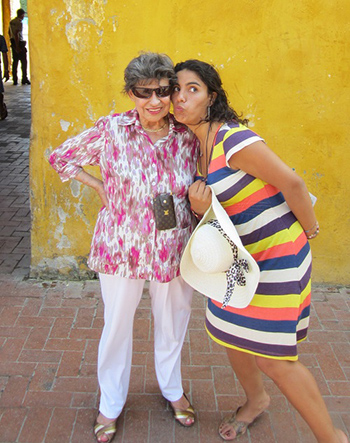A death in the family
They are the illustrations of inescapable, inevitable reality: Death and taxes.
My mother-in-law died last fall. As the sadness was reaching a crescendo, I thought resentfully that the list of dead people I knew had gotten longer AGAIN. This is the part of aging I mind the most. The only mantra I have to counter this resentment is the cliché “death is a part of life.” This created an infernal noise in my head, so I needed to work through various metaphors until I got to one that might get the monkeys to stop chattering: The good thing about deaths and funerals is how they bring people together. Extended family members from various parts of Bogotá and elsewhere in Colombia moved heaven and earth to get to the memorial service, because that’s what you do when someone dies. They celebrated being together again because that never happens any more for holidays. Relational connections of people who hadn’t seen each other in years were sewn back more tightly through contact in that moment of intense emotion. People who might never have crossed paths again hugged each other and cried on each other’s shoulders and told funny stories about Mama Ruby (she refused to be called “Grandma.”) They were close again, the way they were decades earlier when they saw each other more often. Or maybe they never were, really, but when Mama Ruby died she reminded them that all of our days on this earth are numbered, and they wanted to hug people who they realized were important to them.
This happened when other people precious to me died. The relationships that formed and firmed when my academic mentor died at age 53 of cancer are still close now, decades later. Some would have stayed simply acquaintances if we hadn’t gone through his illness and his death together. I became better friends with his widow after he died than I probably would have if he were still alive, because we have related to each other directly instead of through him. Death brings the people on earth closer together, and that’s the sense in which it’s part of life.
Yes, the person who dies leaves a hole in the fabric of the social world, and those holes hurt. Sometimes it’s a little hole, when six people stand at your graveside and say “if it were up to Elsie Kay she’d have died 10 years ago” when she still had enough friends and family alive to hold her funeral in a church without feeling silly. Sometimes it’s a crater, when hundreds of people gather to sob and say “the world is not the same without you in it, you changed my life forever and you died way too soon.” Yes, those holes hurt, but people work to patch them up by making, or making stronger, connections to each other.
Patching looks like this: People holding each other while they cry, sometimes in public, often people who would otherwise never cry in public, or maybe at all. Facebook friending (unlike some others, I think important things happen that way), and messages of comfort, and stories from a beautifully remembered past come in sympathy cards, from people who ordinarily are not in touch. Donations are made in the name of the person who died, to a cause they held dear. The fabric of human connection gets stronger when those things happen, and I want to think that it stays that way somewhere deep inside people, or out in the universal well of human goodness. That’s the sense in which death is part of life, and a way to stop whimpering about knowing too many dead people. For every person on that list, I will try to count the connections that got stronger because I shared the grief with others who were left. I will count the friendships that exist because someone died when they did, rather than decades later. Although I would gladly hand back the friendship to have that someone alive again, I haven’t yet been offered that option. In that case, I’ll take – with profound gratitude and a sense of wonder – those human connections. They are tiny mending places around the jagged edges of the holes those deaths leave in my life. Maybe I can only fully treasure them once I stop cursing the holes.
Commenting is not available in this channel entry.


Comments